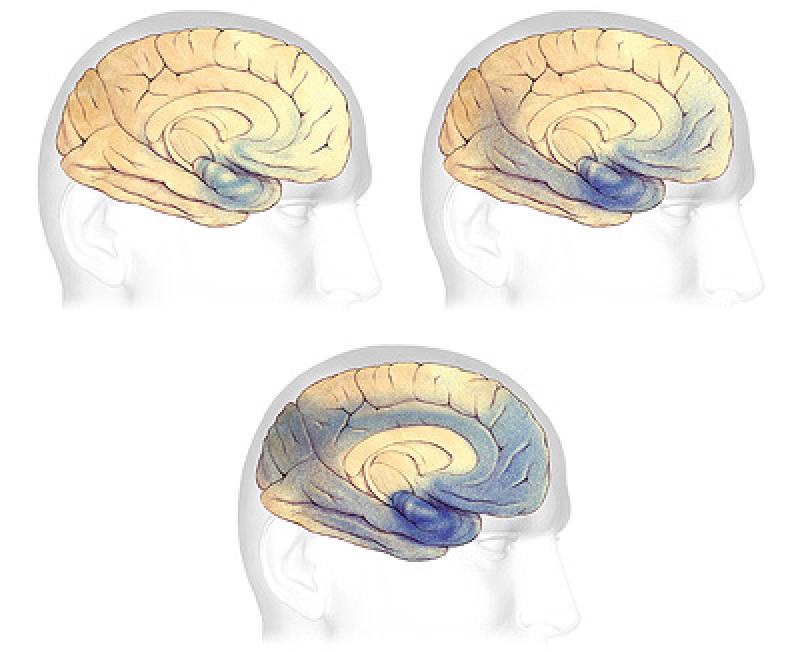Alzheimer's: The Issue Republicans and Democrats Agree On | Opinion


Judging by the daily headlines and late-night television conversations, there’s not much that Republicans and Democrats agree on. But as governors from two different sides of the political spectrum and the country, we know there are many issues that affect us all. One is Alzheimer’s disease.
Alzheimer’s disease doesn’t care if you’re a Republican or a Democrat, if you’re from Massachusetts or Montana. The truth is that even if you are someone who does not develop Alzheimer’s, almost everyone could someday find themselves caring for a loved one with the disease.
Alzheimer’s is the most expensive disease in America, and the only leading cause of death in the U.S. that cannot be prevented, cured, or even slowed.
As a result, the costs of health care and long-term care for individuals with Alzheimer's or other dementias are so substantial that it could bankrupt Medicare. According to the Alzheimer’s Association , in 2018 alone, Alzheimer’s and other dementias will cost the nation $277 billion in direct costs, including $186 billion in Medicare and Medicaid payments. By 2050, that figure could rise as high as $1.1 trillion, including one in every three Medicare dollars.
Today, more than five million Americans are living with Alzheimer’s, 130,000 and 20,000 of whom are in Massachusetts and Montana , respectively. Equally as devastating are the costs imposed on caregivers of those with the disease, who in Massachusetts and Montana absorb nearly $350 million in additional health care costs each year. These extra costs often require families to make significant lifestyle changes in order to afford care, including downsizing their homes, taking out loans, getting second jobs, taking time away from school, and putting off retirement.
And it’s not just excessive out-of-pocket costs either. This year, caregivers will provide 18.4 billion hours of unpaid care , valued at over $232 billion. Alzheimer’s takes a devastating toll on caregivers. Compared with caregivers of people without dementia, twice as many caregivers of those with dementia indicate substantial emotional and physical difficulties, too.
In order to change this trajectory, we must take bold, unified steps now toward a better nationwide Alzheimer’s public health response.
That is why we are reaching across the aisle and joining together to heed the call of Americans from Massachusetts, Montana and across the country by calling on Congress to elevate Alzheimer’s as an urgent bipartisan issue. We urge Congress to pass the BOLD Infrastructure for Alzheimer’s Act (S. 2076/H.R. 4256), a piece of legislation supported by many members of our own congressional delegations.
If passed, the BOLD Infrastructure for Alzheimer’s Act would establish Centers of Excellence around the country to expand and promote innovative and effective Alzheimer’s interventions. It would also provide state, local, and tribal public health officials with the funding and resources necessary to implement those interventions, and to promote early detection and diagnosis, reduce risk, prevent avoidable hospitalizations, and mitigate health disparities.
Just as importantly, the BOLD Infrastructure for Alzheimer’s Act would support the needs of caregivers and support care planning for people living with the disease. As a result, those living with Alzheimer’s would be able to live in their homes longer, thus delaying costly institutionalized care.
State and federal policymakers, from governor’s mansions to the White House, would also be better equipped to make informed decisions when developing plans and policies to combat the disease, thanks to increased collection, analysis and timely reporting of the data necessary to track progress and identify opportunities for intervention.
Alzheimer’s impacts us all in some way—as a taxpayer, loved one, caregiver, or by developing the disease ourselves. Regardless of socioeconomic standing, geographic location or political beliefs, we should all be concerned about the public health threat posed by Alzheimer’s.
With the appropriate and necessary resources, we have the opportunity to invest in our nation’s Alzheimer’s response and improve the lives of millions of Americans.
Steve Bullock is the Democratic governor of Montana. Charlie Baker is the Republican governor of Massachusetts.
The views expressed in this article are the authors' own.





Let's put a tax on Wall St. transactions and fund an all out war on Alzheimer's disease.
I say tax Wall St transactions because these are the people who make money for doing nothing other than having money to invest. Let them contribute to a great national cause.
As if I needed another reason not to vote for people that want to raise taxes. Dementia has hit my own family and I stand opposed to taxation to fund research and treatment. Anyone that wants to donate their money is free to do so.
So, you want to take something that's not political and make it political. Great.
Thanks for posting this, John. I don't have Alzheimer's, but I live with it every day of my life...as you well know. My father's once brilliant mind has been reduced to that of a five to seven-year-old child. The horrible thing is that he remembers being an aerospace engineer, but he is no longer able to comprehend and react to life's equations like one. There are still moments where he remembers that he is my Poppy, but those moments are few and far between. The good news is that my brother has removed all of Pop's power tools, and I am pretty sure I have confiscated his last secret stash of super-glue, car keys, and what's left of his knife collection. Now we just need to find where he has hidden 2 hand saws, an axe, and the hot glue gun...
Sounds like you have your hands full Sister. And there is no light at the end of the tunnel. There needs to be a national urgency to address this.
I completely agree and it would affect me and I have no problem with that at all.
I watched what it did (is still doing) to a friend in Vegas. His wife started with it early on, early 50's, so financially it pretty much wiped him out. Now she is under medicare and in a institution since he had to go back to work to pay the bills and could not afford live in care for her.
It is such a devastating disease and it destroys the care takers as well.
This is going to sound horrible, but there isn't a week that goes by where I don't feel some measure of regret for promising my father I would take care of him to the end. The feeling of inadequacy never goes away. But the thought of either he, or my mother (who is in end-stage Parkinson's) being cared for by strangers who probably couldn't care less, is scarier than the diseases themselves.
No, it doesn't sound horrible, it sounds very human. I have a lot of admiration for you and the care that you're giving your parents.
It has to be extremely difficult for you sister.
Dear Friend SMAAB: For Pastoral Care and support for you and anyone you wish I am available.
Contact is encouraged.
First by site private note.
Then by private email.
All in confidence.
Your values, beliefs etc. all desired.
To be there for others, first you nee to liberate yourself by taking care of your needs.
Caring for those in such situations can be a tremendous challenge.
You are not alone.
Part of your support matrix, if wanted and needed, solely on your terms can be me.
I will be here for you.
Peace and Abundant Blessings to You and Yours.
May all this turn out as well as is possible under this and future circumstances for all involved.
Enoch.
I am so sorry to hear about your Father, Sister. My Maternal Grandfather suffered from that terrible disease for many years. HE lost all memory of anyone in his family, and the longer he lived, the more like a very young child he became, losing all control of bodily functions and having to be treated like a baby in diapers. On top of that, he became blind and deaf, and would often simply sit and cry for hours, so lost in his own world of non-reality. He hardly spoke, and often would ramble in some foreign language, seemingly German, but, no one could understand what he was trying to say as none of the words came together to form any coherency.
When he finally walked on, we grieved fro the man who had been mentally lost many years before, but, were relieved that he had finally been able to find peace from the disease that robbed him of the man he had once been.
I know ho very hard it is for the family to see their loved one suffer from such a terrible disease, and although they may not understand where the waves of love are coming from, it is enough they know it is there. My prayers from the heart go out to you, your beloved Father, and your family, and may He continue to give your the strength to be there for our Father when he needs you most.
I had to help take care of grandmother with Alzheimer's when I was 12-13. tough but helped my parents and Aunt and Uncle. Had to eventually put her in nursing home.